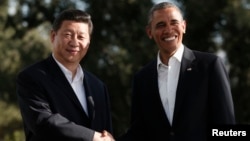BEIJING —
Chinese President Xi Jinping is scheduled to meet with U.S. President Barack Obama on the sidelines of the G20 Summit in St. Petersburg. Syria is expected to be a key topic during the meeting, but political analysts in Beijing say it is unlikely China will waver in its opposition to U.S.-led military action in the war torn country.
The meeting between Obama and Xi will be their first since the two met earlier this year at a resort in California. At that casual, no necktie summit, the two focused more on a host of thorny issues that confront U.S.-China relations.
This meeting will be much different. This time, the two will be sitting down on the sidelines of a summit for the Group of 20 leading world economies, a largely economic gathering that is being overshadowed by the conflict in Syria.
China has repeatedly voiced its opposition to military action in Syria and has long opposed any form of intervention in the civil war. Along with Russia, it has already vetoed two United Nations resolutions aimed at pressuring Syrian President Bashar al-Assad.
Chinese Foreign Ministry spokesman Hong Lei issued a stern warning against military action once again on Thursday. "Unilateral military actions go against international law and the norms of international relations and will further complicate the Syrian issue and cause the Middle East more turbulence,” he said.
Speaking with reporters in Russia Thursday, China’s Vice Finance Minister Zhu Guangyao echoed that position and went even further. Zhu warned that military action would have a negative impact on the global economy as well as the price of oil.
Political analysts in Beijing said the meeting between Obama and Xi is not likely to be confrontational, but add there is very little room for negotiation.
“China's position is close to Russia, and if Russia shifts its stance, China might also not maintain a confrontational attitude towards the United States. At present, though, there is very little room for agreement between China and the U.S. on Syria,” stated Chen Qi, a political scientist at Beijing’s Tsinghua University.
Shi Yinhong, a political scientist at Beijing’s Renmin University, said he doubts either side has high expectations going into the meeting given their respective stances. He said that if the U.S. wants China’s support, it should go to the U.N. Security Council first. “America’s position is fixed and President Xi Jinping can’t say to Mr. Obama 'abandon your plans for a military strike,'” he explained.
Even so, Shi said Xi is likely to still make his opposition to unilateral action clear.
Chen Qi said that given that Xi will meet with both Russia’s president and Obama while in St. Petersburg, it is even more unlikely that China’s stance could change. But he said that personally, he believes Beijing should do just that.
“I think China should support U.S. military intervention in Syria because it would be an opportunity to shape a strategic cooperation between the two countries," Chen Qi said. "And also China would benefit rather than be harmed by a military operation.”
Chen added that more U.S. focus on the Middle East means less pressure on China in the Pacific region.
The meeting between Obama and Xi will be their first since the two met earlier this year at a resort in California. At that casual, no necktie summit, the two focused more on a host of thorny issues that confront U.S.-China relations.
This meeting will be much different. This time, the two will be sitting down on the sidelines of a summit for the Group of 20 leading world economies, a largely economic gathering that is being overshadowed by the conflict in Syria.
China has repeatedly voiced its opposition to military action in Syria and has long opposed any form of intervention in the civil war. Along with Russia, it has already vetoed two United Nations resolutions aimed at pressuring Syrian President Bashar al-Assad.
Chinese Foreign Ministry spokesman Hong Lei issued a stern warning against military action once again on Thursday. "Unilateral military actions go against international law and the norms of international relations and will further complicate the Syrian issue and cause the Middle East more turbulence,” he said.
Speaking with reporters in Russia Thursday, China’s Vice Finance Minister Zhu Guangyao echoed that position and went even further. Zhu warned that military action would have a negative impact on the global economy as well as the price of oil.
Political analysts in Beijing said the meeting between Obama and Xi is not likely to be confrontational, but add there is very little room for negotiation.
“China's position is close to Russia, and if Russia shifts its stance, China might also not maintain a confrontational attitude towards the United States. At present, though, there is very little room for agreement between China and the U.S. on Syria,” stated Chen Qi, a political scientist at Beijing’s Tsinghua University.
Shi Yinhong, a political scientist at Beijing’s Renmin University, said he doubts either side has high expectations going into the meeting given their respective stances. He said that if the U.S. wants China’s support, it should go to the U.N. Security Council first. “America’s position is fixed and President Xi Jinping can’t say to Mr. Obama 'abandon your plans for a military strike,'” he explained.
Even so, Shi said Xi is likely to still make his opposition to unilateral action clear.
Chen Qi said that given that Xi will meet with both Russia’s president and Obama while in St. Petersburg, it is even more unlikely that China’s stance could change. But he said that personally, he believes Beijing should do just that.
“I think China should support U.S. military intervention in Syria because it would be an opportunity to shape a strategic cooperation between the two countries," Chen Qi said. "And also China would benefit rather than be harmed by a military operation.”
Chen added that more U.S. focus on the Middle East means less pressure on China in the Pacific region.




